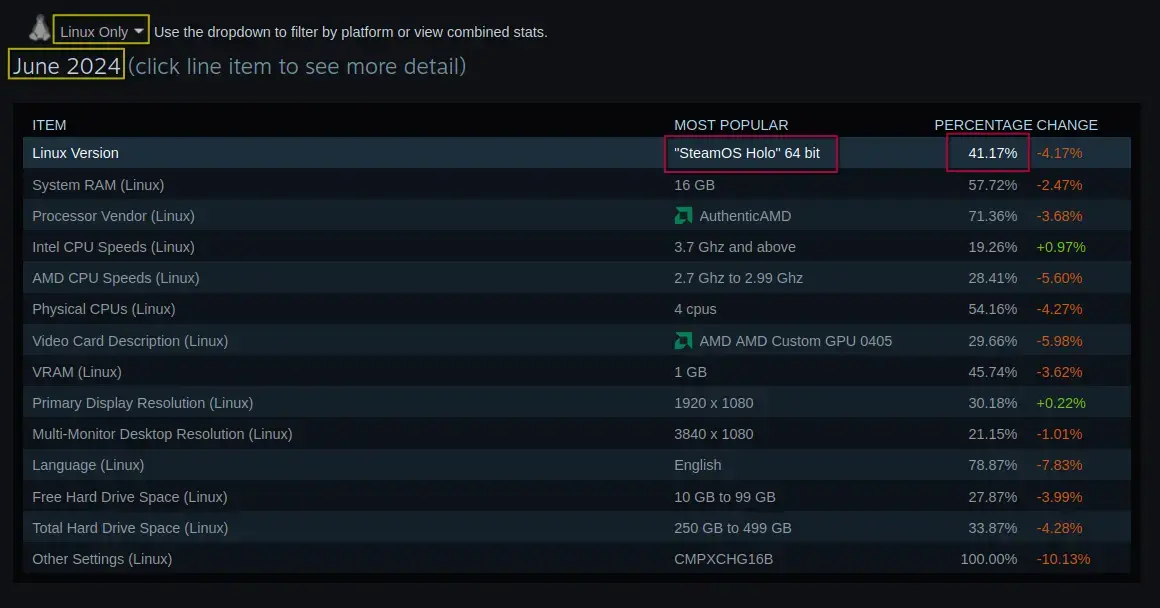It peaked at 4.05% in March. The last 2 months it went just below 4% as the Unknown category increased. For June the reverse happened, so 4.04% seems to be the real current share of Linux on Desktop as desktop clients were read properly/werent spoofed.

In all seriousness, I think government bodies switching to Linux (UK’s, China’s, some Indian states’) attributes the most to this.

Even if that’s the case, it’s telling of Linux’ maturity.

Oh absolutely!

No I think it’s the Steam Deck. It’s like half of all actively used Linux machines.

Half of the Linux machines on Steam, not the entirety of Linux.
Yes sorry you’re right

A very important distinction

But that’s not really a Desktop is it? If we’d count mobile device we’d also have to include Android and then the situation would look completely different.

Steam Deck is a desktop. It is exactly the same PC hardware and software you are using on your desktop PC. It runs the same games and is software compatible. Steam Deck is a desktop PC.
Android has a different hardware (not x86 compatible), is focused on phones, its eco system of software is not compatible with PC and in reverse does not run your PC software. Android based smartphones are not a PC.

But how many use it for browsing, which I imagine this data is from?

Valid point to be honest, but the answer is probably more than you think. I have a PC and still used the Steam Deck to browse the web too, not at least to install stuff. Also searching something while playing is useful too. Its made to be docked to bigger screen as well.
While you are probably right, my point was its still a PC, because he compared it to Android. And why this is hugely different. His point was to exclude Steam Deck, because it is not a PC, just like we would exclude Android. This data from the stats probably does not make a difference if its a Steam Deck or not (nor can it tell it? because browsing is the same as on PC, its an Archlinux and regular browser after all). On the other side it can definitely tell if its Android and exclude it.
So regardless if you think people browse the web with Steam Deck or not, this data should not be able to tell the difference between most distributions and Steam Deck, as its just a normal PC with Firefox (or other web browser) from the point of the stats. Just my assumption.

So your definition for “desktop” is if it’s an x86 compatible architecture? Seems pretty random to me. Btw, there are x86 android device. IMO a desktop is something on the top of a desk to do typical “office work”. PCs, Macs, Laptops, etc. but calling a SteamDeck game console “Desktop” is pretty dishonest I think.

PC in the first place means x86 architecture. Desktop is the operating system, here a Linux desktop or Windows OS. Nothing random here. Steam Deck is a Desktop PC with form factor of a handheld. Just like any other Laptop is a Desktop PC in a notebook form factor. It runs, plays and uses the exact same hard and software as a Desktop PC. Calling Steam Deck PC not to be a Desktop is pretty dishonest. Also saying desktop PC must be on a desk for typical office work is random too.
Also this is all about stats. Don’t forget, this is not your opinion or my opinion. I am speaking from the stats perspective, as the Firefox browser (or any other browser) is just a Desktop PC from the perspective of the stats.
If you say I am pretty random and being dishonest, then first, you are discounting others opinions, secondly did not even understand the purpose of my reply. Maybe you should watch out your language next time before responding if you want further discussion. I hope my reply here made it crystal clear.

The names are pretty clear and are about form factor. Desktop is something on top of a desk. Laptop is something on top of your lap. Hand-held is something you hold in your hand.
The steam deck is a hand-held game console - doesn’t matter what OS is it uses. It’s true that most stat tracking sites count it as “desktop” but not because it’s a desktop computer but because the user agent looks similar to desktop user agents.
If I install Android on a tower PC it doesn’t randomly become a smartphone even though all browser trackers would register it as a smartphone.
And Valve using a “typical desktop OS” on their handheld console doesn’t magically turn it into a desktop PC.

The example with Android makes no sense as a argument in our discussion.
The steam deck is a hand-held game console - doesn’t matter what OS is it uses
Wrong. It does matter. Plus, it matters what software and what configuration it uses the moment it gets counted in the stats.
The discussion is not about what you try to tell. You can say what you want, it does not matter that the Steam Deck uses hardware that is PC and software that is a hybrid of Desktop and Gaming operating system. And when going to the web with a web browser, then the Steam Deck is in Desktop mode, and therefore seen as a Desktop PC. Not only act it like that, the functionality is a Desktop PC.
The Steam Deck has two modes if you forgot that, and we are talking about the Desktop PC mode. Which is what the stats are all about.
We don’t include Android here. What I meant is that the Steam Deck does count in that statistics.

Connect the Steam Deck to a compatible dock and you can quite easily use it as a desktop. At the end of the day, it’s still an x64 based PC that’s just handheld.

I’m not sure that’s really a good argument. I can connect an android smartphone to a monitor, keyboard and mouse and call it Desktop. It’s also just an arm64 or x64 based PC just handheld.
A Desktop PC IMHO is a device that is used for everyday “office” work and neither android smartphones nor steamdecks are that - but laptops for example are (IMHO)

Source? Last I checked, the Steam Deck was very much in the minority even when narrowed down to just desktop Linux.

Source is the Steam hardware survey set to show Linux data only. He forgot to mention the statement is only true for Steam Gamers, not for all of Linux desktops outside of Steam.


I believe the Steam Deck would be a significant portion of the Linux desktops, but Steam’s survey might be a biased source, still

What does significant portion mean to you?

I can imagine it’d affect statistics enough to see a clear change
I confused it with Steam statistics sorry

no, the statistics are based on browser agents, very few steam deck users browse the Internet on their devices. it’s also only half the Linux devices on steam, not of all Linux desktops

In Steam maybe. But this is StatCounter which is website visits. I doubt many Deck users are browsing the web.
For some reason I think a lot of them (probably even more than half) have tried browsing the web or at least using the desktop mode at least once.

Oh that is a good point, why didn’t I think of that!

I’m fairly sure it’s deficiencies in StatCounter’s measurement that’s accounting for it. Statistical noise, basically.


The youtuber matt from thelinuxcast sucks.
I am regular user, i don’t code for living and my job is not tech related. I wanted to try linux and many of you guys supported and now I’m using Linux since 2 weeks its linux mint. That matt guy was so against linux mint that i thought it was shit too. But when i installed and started using it. It has been a smooth journey. Many people in linux community were helpful. But people like matt really make it for us regular guys scared to use linux. I really hope many good linux user help regular people switch to linux and increase this number.

I get what you mean. I see a decent chunk of often more tech-proficient Linux users putting down Linux Mint, and it saddens me because even though I don’t use Mint anymore, it was still the first distro I properly daily-drove and I still consider it an amazing system for people who are new to Linux.
I’m very glad you’ve been having a good experience with Mint!

I don’t get them putting Mint down either, and I’ve built multiple Gentoo systems… I don’t need an easy distro but still use Mint and like it for what it brings (basically, it’s Green Ubuntu, what Ubuntu was supposed to be before they lost their way)

I assume the problem is hardware. Matt’s hardware didn’t work well with LM, therefore Matt thinks LM sucks… I do wish there was better hardware support but it’s the reason apple went with 1 product = 1 OS = 1 general set of hardware. Sure not every iPhone has the same hardware, but that’s why they have the model numbers, and it’s so much easier to test 200 model mixes than 2,000,000 (Android). Windows gets all the debug info sent directly to them like the others but they also have a huge stack of hardware they can use or they can buy it to test.

Did Matt try putting the regular build on a newish machine? That’s what I did with my current and was struggling until I put the latest kernel on it, should have gone with Edge, but had little trouble after)
- LeFantome ( @LeFantome@programming.dev ) 2•4 days ago
This is an interesting post. I know the YouTuber you are talking about. I do not really like him but I would have considered him harmless. It is interesting to get your take.
Mint is great and quite popular. So, if you are going to make a YouTube video saying otherwise, I guess you have to go out of your way to come up with reasons why. I am sure that makes it sound worse than it is. Something to think about.
I have distro preferences too but most of the differences really only make a difference to those already using Linux. It is a bit like arguing about Ford vs Chevy in front of people that have never seen a car ( or truck ). In the grand scheme, they are both amazing and mostly the same thing. To listen to a fan though, one is God’s gift and the other is trash. Same with Linux distros.

I switched to librewolf so I will now show up as windows

After seeing Garuda Linux set my user agent to Windows, I set my Windows install user agent to Linux.
Seeing Twitch.tv login break after changing my user agent was hilarious

I unspoofed Librewolf back to Firefox + Linux. That way I’m not contributing to Chrome and Windows market share and perceived dominance. Plus the more people don’t spoof, the less of a need there will be to actually spoof at all as the Linux market share increases.

The problem is that websites sometimes change there behavior.

Do you have any examples of this?

Same, there must be a percent or so of Windows actually being Linux instead.

Yeah me too, safety in numbers. Maybe if Linux desktop gets bigger than Windows they’ll swap it around 👨💻

Man i hope linux becomes more popular

I see multiple posts on reddit everyday asking for advice for migrating to linux. I think linux userbase is increasing a lot since Window’s questionable recall announcement.

And the valve steamdeck But some people install windows on it which defeats it’s linux purpose

Nevertheless, Valve’s work with proton has pretty much crushed the argument that Windows is needed for games. That use to be a major sticking point, preventing people from leaving Windows - but now not so much.

If you play games that requires anti cheat It’s gonna be harder to switch

Fwiw, my blog’s statistics say Linux is around 10% and I know a lot of browsers identify themselves as running on Windows when they’re not, so I wonder how it’s measured.

What’s is the main topic of your blog?

Travel, nothing tech related

I would wager thats your audiences bias showing up. If you did that measurement in lemmy users, you would get likely 90% Linux users.

We should do a poll, who uses Linux?

Seems like you will get a biased sample here…

Why?
(Joking)

I am still hoping it will hit 10% market share within my life time. I remember when it was predicted to hit that in 2010, obviously it didn’t happen*. Of course for me personally, the year of the Linux Desktop was 2007 when I was finally able to use it as my main OS at home, I tried it before many times since 2003.
* not counting systems that use the Linux kernel but aren’t considered a traditional GNU+Linux desktop.

I am still hoping it will hit 10% market share within my life time.
Do we really want that?
We have it pretty good right now. I would actually say we’re living in a golden age of desktop Linux: there’s constant innovation, good support, you get to do pretty much everything you need, while flying under the radar.
Linux has won the majority of the industry (servers, mobile etc.) so it’s not like it has anything left to prove.
If it starts getting noticeable on the desktop I fear we’re just gonna get negative attention. Users who take and not contribute, because Windows had taught them to be entitled. Unwanted attention from Microsoft, who I bet are not going to be doing nice things once they start getting paranoid about it.
I really don’t think that large companies like Adobe will care about Linux even at 10% and even if they did, they are a super toxic company nowadays, the least we get to interact with them the better.

Do we really want that?
As long as competition and choice continues to be the mantra of the Linux desktop, then yes, I’d love to see more and more people using it.
We have it pretty good right now. I would actually say we’re living in a golden age of desktop Linux: there’s constant innovation, good support, you get to do pretty much everything you need, while flying under the radar.
Very true.
Unwanted attention from Microsoft, who I bet are not going to be doing nice things once they start getting paranoid about it.
I mean, Ballmer called Linux a cancer pretty early on, so that ship sailed a long time ago.
I really don’t think that large companies like Adobe will care about Linux
Once they start losing large sums of money due to people switching and finding viable alternatives, they certainly will care. Right now Adobe has one main thing going for them – apathy and muscle memory of the aging demographic of their users. That will eventually change.
the least we get to interact with them the better.
Absolutely. I used to be an Adobe fan, back when Kevin Lynch was a part of it, and I was a Flex developer. Then Jobs wrote his thing about Flash, and a year later, not a month after Jobs’s death, Adobe dumps Flex – and literally overnight my position changed from Flex to HTML5 and Java.

not counting systems that use the Linux kernel but aren’t considered a traditional GNU+Linux desktop.
Does that mean you don’t count Alpine towards Linux market share? It mostly doesn’t use any GNU stuff.
You can also compile the kernel with LLVM instead of gcc, use musl instead of glibc, and use BSD coreutils instead of GNU coreutils.

Do they use the BSD userland instead? Interesting…
Perhaps the definition isn’t good enough or accurate. What would you call a system that perhaps uses Darwin kernel or Hurd plus GNU user land, or any combo of.

Do they use the BSD userland instead? Interesting…
I think Alpine uses Busybox, but it’s feasible for a Linux distro to use BSD coreutils. Not sure if any do that, though.

404: Not found

OK, who did you guys bully over basic tech support questions?

uMatrix prevents me from loading this statcounter website. :-( Can’t lookup how they measure things. In the comments people assume the stats would be counted by just looking up the user agent, which is a naive approach. I don’t think agencies dedicated to stats are doing it this simple. They have way more possibilities to track and to look what browser you are using. The stats are more accurate than you probably think. They do not need to know the exact version of browser you are using, just which type and maybe what operating system you are on.
If a script for Windows does not work on Linux and fails, then they know you are not on Windows in example.

Why are you still using uMatrix in 2024? Wasn’t it discontinued 3 years ago or smth?

It’s still useful with all its functionality. Even if it does not get updates, it still blocks most stuff and I can enable or block stuff too. Plus the blocklists it uses are still updated, as they act independently from the main addon. There is no better alternative in my opinion. I use uMatrix + uBlock Origin.

Where do they get data from?

From cookies.

What kind? Personally I wouldn’t trust any kind with raisin.

From analytic cookies.

What about peanut butter? Or are you more of a salted chocolate kind of person?

Both are very trustworthy.

They get the data from user-agent strings, so it may not be 100% accurate

User agent strings are frozen these days, at least in Chrome. They still have the browser major version and OS name at least, but Windows will always report Windows 10, Android will always report Android 10, MacOS will always report 10.15.7, and Linux is just “Linux x86_64”: https://www.chromium.org/updates/ua-reduction/
User agent strings are essentially deprecated and nobody should be using them any more. They’ve been replaced by User-Agent Client Hints, where the site can request the data it needs, and some high-entropy things (ie fields that vary a lot between users) can prompt the user for permission to share them first.

Oh nice. Googie once again deciding for the entire Internet what it should be using and forcing it down everyone’s throats.

User agents were commonly used for the wrong reasons - fingerprinting, sites that block particular browsers rather than using proper feature detection, etc. so I’m glad to see them slowly going away.

Question: Why is BSD so low? (And why/what is unknown?)

The BSDs got screwed over by a lawsuit in the 90s that made a lot of people hesitant to use them (coincidentally leading to the creation of the Linux kernel). Inertia carried it from there and Linux ended up getting more hardware and software support, which is the primary reason that people pick Linux over the BSDs now.

Less hardware support than Linux without enough substantially better about it to make it anyone’s clear preference. Which isn’t to say it doesn’t have advantages over Linux. Just that the average BSD user is going to be able to easily swallow their pride and run Linux if things went wrong with a BSD install (trust me, I’ve literally done this, these people do exist)

There really isn’t a compelling argument for BSD other than interest and hobby. It doesn’t have the industrial use case Linux has.

If only linux gaming and thermal became more and more robust, in few year I will switch too with pleasure. Adobe suite can still be a problem but not for me anymore at least.

